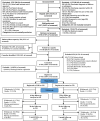A multicentre, pragmatic, cluster randomised, controlled feasibility trial of the POD system of care
- PMID: 32307515
- PMCID: PMC7331094
- DOI: 10.1093/ageing/afaa044
A multicentre, pragmatic, cluster randomised, controlled feasibility trial of the POD system of care
Abstract
Objective: to provide a preliminary estimate of the effectiveness of the prevention of delirium (POD) system of care in reducing incident delirium in acute hospital wards and gather data for a future definitive randomised controlled trial.
Design: cluster randomised and controlled feasibility trial.
Setting: sixteen acute care of older people and orthopaedic trauma wards in eight hospitals in England and Wales.
Participants: patients 65 years and over admitted to participating wards during the trial period.
Interventions: participating wards were randomly assigned to either the POD programme or usual care, determined by existing local policies and practices. The POD programme is a manualised multicomponent delirium prevention intervention that targets 10 risk factors for delirium. The intervention wards underwent a 6-month implementation period before trial recruitment commenced. Main outcome measure incidence of new-onset delirium measured using the Confusion Assessment Method (CAM) measured daily for up to 10 days post consent.
Results: out of 4449, 3274 patients admitted to the wards were eligible. In total, 714 patients consented (713 registered) to the trial, thirty-three participants (4.6%) withdrew. Adherence to the intervention was classified as at least medium for seven wards. Rates of new-onset delirium were lower than expected and did not differ between groups (24 (7.0%) of participants in the intervention group versus 33 (8.9%) in the control group; odds ratio (95% confidence interval) 0.68 (0.37-1.26); P = 0.2225).
Conclusions: based on these findings, a definitive trial is achievable and would need to recruit 5220 patients in 26 two-ward hospital clusters. Trial registration: ISRCTN01187372. Registered 13 March 2014.
Keywords: delirium; hospitals; multicomponent interventions; older people; prevention.
© The Author(s) 2020. Published by Oxford University Press on behalf of the British Geriatrics Society.
Figures

Similar articles
-
Investigation of ward fidelity to a multicomponent delirium prevention intervention during a multicentre, pragmatic, cluster randomised, controlled feasibility trial.Age Ageing. 2020 Jul 1;49(4):648-655. doi: 10.1093/ageing/afaa042. Age Ageing. 2020. PMID: 32310260 Free PMC article. Clinical Trial.
-
The Prevention of Delirium system of care for older patients admitted to hospital for emergency care: the POD research programme including feasibility RCT.Southampton (UK): NIHR Journals Library; 2021 Mar. Southampton (UK): NIHR Journals Library; 2021 Mar. PMID: 33819001 Free Books & Documents. Review.
-
Prevention of delirium (POD) for older people in hospital: study protocol for a randomised controlled feasibility trial.Trials. 2015 Aug 8;16:340. doi: 10.1186/s13063-015-0847-2. Trials. 2015. PMID: 26253332 Free PMC article. Clinical Trial.
-
The AMBER care bundle for hospital inpatients with uncertain recovery nearing the end of life: the ImproveCare feasibility cluster RCT.Health Technol Assess. 2019 Oct;23(55):1-150. doi: 10.3310/hta23550. Health Technol Assess. 2019. PMID: 31594555 Free PMC article. Clinical Trial.
-
A facilitated home-based cardiac rehabilitation intervention for people with heart failure and their caregivers: a research programme including the REACH-HF RCT.Southampton (UK): NIHR Journals Library; 2021 Feb. Southampton (UK): NIHR Journals Library; 2021 Feb. PMID: 33617178 Free Books & Documents. Review.
Cited by
-
Non-pharmacological interventions for preventing delirium in hospitalised non-ICU patients.Cochrane Database Syst Rev. 2021 Nov 26;11(11):CD013307. doi: 10.1002/14651858.CD013307.pub3. Cochrane Database Syst Rev. 2021. PMID: 34826144 Free PMC article.
-
Investigation of ward fidelity to a multicomponent delirium prevention intervention during a multicentre, pragmatic, cluster randomised, controlled feasibility trial.Age Ageing. 2020 Jul 1;49(4):648-655. doi: 10.1093/ageing/afaa042. Age Ageing. 2020. PMID: 32310260 Free PMC article. Clinical Trial.
-
Non-pharmacological interventions for preventing delirium in hospitalised non-ICU patients.Cochrane Database Syst Rev. 2021 Jul 19;7(7):CD013307. doi: 10.1002/14651858.CD013307.pub2. Cochrane Database Syst Rev. 2021. PMID: 34280303 Free PMC article.
-
Outcomes of a Delirium Prevention Program in Older Persons After Elective Surgery: A Stepped-Wedge Cluster Randomized Clinical Trial.JAMA Surg. 2022 Feb 1;157(2):e216370. doi: 10.1001/jamasurg.2021.6370. Epub 2022 Feb 9. JAMA Surg. 2022. PMID: 34910080 Free PMC article. Clinical Trial.
-
[Nonpharmaceutical concepts for prevention and treatment of delirium].Z Gerontol Geriatr. 2021 Dec;54(8):759-767. doi: 10.1007/s00391-021-01988-3. Epub 2021 Nov 24. Z Gerontol Geriatr. 2021. PMID: 34817684 Review. German.
References
-
- Belanger L, Ducharme F. Patients' and nurses' experiences of delirium: a review of qualitative studies. Nurs Crit Care 2011; 16: 303–15. - PubMed
-
- Witlox J, Euelings LSM, Jonghe JFM et al. . Delirium in elderly patients and the risk of postdischarge mortality, institutionalization, and dementia: a meta-analysis. J Am Med Assoc 2010; 304: 443–51. - PubMed
-
- Martinez F, Tobar C, Hill N. Preventing delirium: should non-pharmacological, multicomponent interventions be used? A systematic review and meta-analysis of the literature. Age Ageing 2015; 44: 196–204. - PubMed

